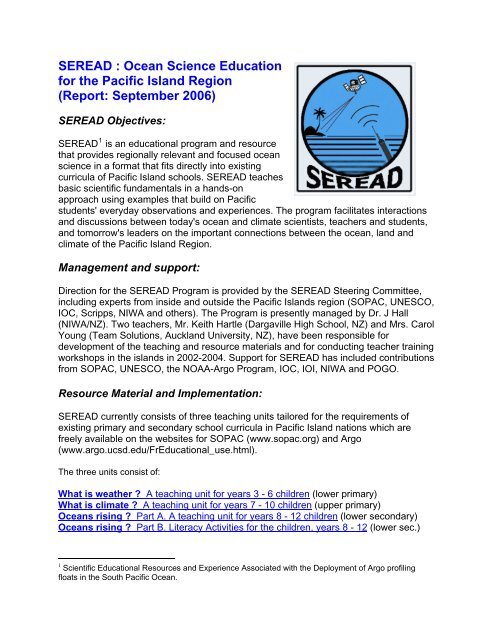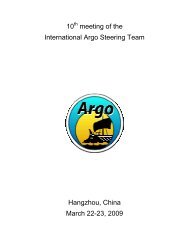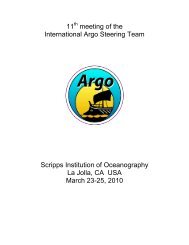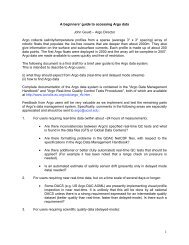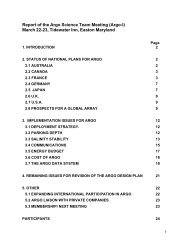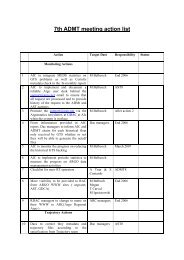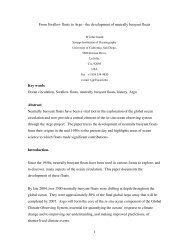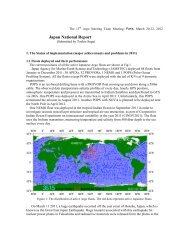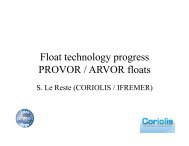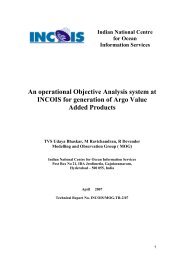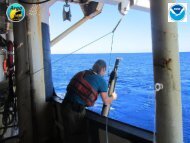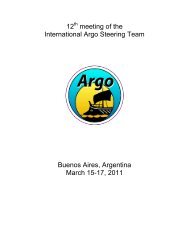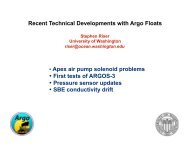You also want an ePaper? Increase the reach of your titles
YUMPU automatically turns print PDFs into web optimized ePapers that Google loves.
<strong>SEREAD</strong> : Ocean Science Education<br />
for the Pacific Island Region<br />
(Report: September 2006)<br />
<strong>SEREAD</strong> Objectives:<br />
<strong>SEREAD</strong> 1 is an educational program and resource<br />
that provides regionally relevant and focused ocean<br />
science in a format that fits directly into existing<br />
curricula of Pacific Island schools. <strong>SEREAD</strong> teaches<br />
basic scientific fundamentals in a hands-on<br />
approach using examples that build on Pacific<br />
students' everyday observations and experiences. The program facilitates interactions<br />
and discussions between today's ocean and climate scientists, teachers and students,<br />
and tomorrow's leaders on the important connections between the ocean, land and<br />
climate of the Pacific Island Region.<br />
Management and support:<br />
Direction for the <strong>SEREAD</strong> Program is provided by the <strong>SEREAD</strong> Steering Committee,<br />
including experts from inside and outside the Pacific Islands region (SOPAC, UNESCO,<br />
IOC, Scripps, NIWA and others). The Program is presently managed by Dr. J Hall<br />
(NIWA/NZ). Two teachers, Mr. Keith Hartle (Dargaville High School, NZ) and Mrs. Carol<br />
Young (Team Solutions, Auckland University, NZ), have been responsible for<br />
development of the teaching and resource <strong>material</strong>s and for conducting teacher training<br />
workshops in the islands in 2002-2004. Support for <strong>SEREAD</strong> has included contributions<br />
from SOPAC, UNESCO, the NOAA-<strong>Argo</strong> Program, IOC, IOI, NIWA and POGO.<br />
Resource Material and Implementation:<br />
<strong>SEREAD</strong> currently consists of three teaching units tailored for the requirements of<br />
existing primary and secondary school curricula in Pacific Island nations which are<br />
freely available on the websites for SOPAC (www.sopac.org) and <strong>Argo</strong><br />
(www.argo.ucsd.edu/FrEducational_use.html).<br />
The three units consist of:<br />
What is weather ? A teaching unit for years 3 - 6 children (lower primary)<br />
What is climate ? A teaching unit for years 7 - 10 children (upper primary)<br />
Oceans rising ? Part A. A teaching unit for years 8 - 12 children (lower secondary)<br />
Oceans rising ? Part B. Literacy Activities for the children, years 8 - 12 (lower sec.)<br />
1 Scientific Educational Resources and Experience Associated with the Deployment of <strong>Argo</strong> profiling<br />
floats in the South Pacific Ocean.
An additional unit (both for upper secondary school) will be developed in 2006: on the<br />
role of the oceans in the climate system. The unit will promote familiarity and usage of<br />
internet-available ocean datasets in the region, including <strong>Argo</strong>.<br />
<strong>SEREAD</strong> is being introduced into the Pacific school systems through cooperative<br />
arrangements with the local Ministries of Education. <strong>SEREAD</strong> teacher training<br />
workshops have already been conducted in the Cook Islands and Samoa (2002-2003),<br />
with a follow-on workshop held in Samoa (2004) and visits to teachers in the Cooks<br />
(2004). Initial <strong>SEREAD</strong> workshops focus on training of teachers. Follow-on activities are<br />
for training of island-based teacher-trainers and for assessment and feedback on results<br />
of <strong>SEREAD</strong> units. Most of the <strong>SEREAD</strong> funds have been utilised for staging the<br />
workshops and for transportation and expenses of local teachers to attend.<br />
<strong>SEREAD</strong> Activities:<br />
<strong>SEREAD</strong> activities over the past four years have focused on the development of the<br />
resource <strong>material</strong> for the programme and the training of teachers in the use of the<br />
<strong>SEREAD</strong> in the classroom for the Cook Islands and Samoa. These resources have<br />
been updated after each teacher-training workshop based on feedback from the<br />
teachers involved. Also, they have been tailored for the specific country to ensure that<br />
the links with the curriculum are maximized.<br />
Cook Islands<br />
The Cook Islands was the first country where <strong>SEREAD</strong> was introduced. There have<br />
been two sets of training workshops for teachers with a total of forty-four teachers being<br />
trained to use <strong>SEREAD</strong> in the class room. These teachers were from Rarotonga,<br />
Aitutaki and Mangaia. A follow-up visit to Rarotongan schools showed that teachers<br />
were using the <strong>material</strong> in the classroom and the trained teachers were working with<br />
other teachers in their schools. Discussions with the Science Teacher Advisor in the<br />
Cook Islands revealed an urgent need to translate the lower primary school <strong>SEREAD</strong><br />
<strong>material</strong> into the local vernacular language in order to increase the uptake of the<br />
<strong>SEREAD</strong> programme in primary schools.<br />
Samoa<br />
A strong relationship has been developed with the Ministry of Education, Sport and<br />
Culture in Samoa. This has led to Ministry Advisors in science attending the <strong>SEREAD</strong><br />
training workshops and Ministry staff supporting the attendance of teachers at the<br />
training workshops. The <strong>SEREAD</strong> teaching resources are closely aligned with the new<br />
science curriculum in Samoa. There have been two sets of training workshops in<br />
Samoa (the second set was conducted at the request of Ministry staff) with a total of<br />
forty-six teachers being trained. Sixteen of these have been trained as mentors who<br />
have trained over seventy other Samoan teachers in the use of the <strong>SEREAD</strong> resource<br />
<strong>material</strong> in the classroom. Mrs. Young and Mr. Hartle supported these mentor teachers<br />
to run their workshops.
Promotion of <strong>SEREAD</strong> to other Pacific Island countries:<br />
There has been a very positive response to the <strong>SEREAD</strong> programme by teachers due<br />
to the regional relevance of the resource and the effective use of everyday <strong>material</strong> for<br />
demonstrating scientific concepts. The success of the programme in the Cook Islands<br />
and Samoa has resulted in other Pacific Island Nations expressing an interest to<br />
introduce and implement the <strong>SEREAD</strong> programme in their school systems. This was<br />
exemplified when the <strong>SEREAD</strong> programme was presented to the Pacific Islands<br />
Directors of Education Conference in Rarotonga in November 2003. At the conference a<br />
number of countries expressed a keen interest in the <strong>SEREAD</strong> programme being<br />
introduced into their education system. These countries included Niue, Marshall Islands,<br />
Federated States of Micronesia and Tuvalu. We have also had discussions with the<br />
Curriculum Advisors of the Fijian Ministry of Education, who have declared a keen<br />
interest in the programme and a willingness to look at implementation once they have<br />
completed an extensive curriculum review.<br />
A Working Group considering Ocean Science Education Issues in the South Pacific was<br />
convened at the SOPAC/STAR Annual Sessions in Samoa, September 2005.<br />
Discussion in the group clearly indicated an interest from all the Pacific Island Nations to<br />
either introduce or improve marine science education at the primary and secondary<br />
school levels. All participants indicated their desire to access and use the <strong>material</strong> in<br />
the most appropriate format for their countries. Island country representatives also<br />
requested the translation of the <strong>material</strong> into the local vernacular language.


